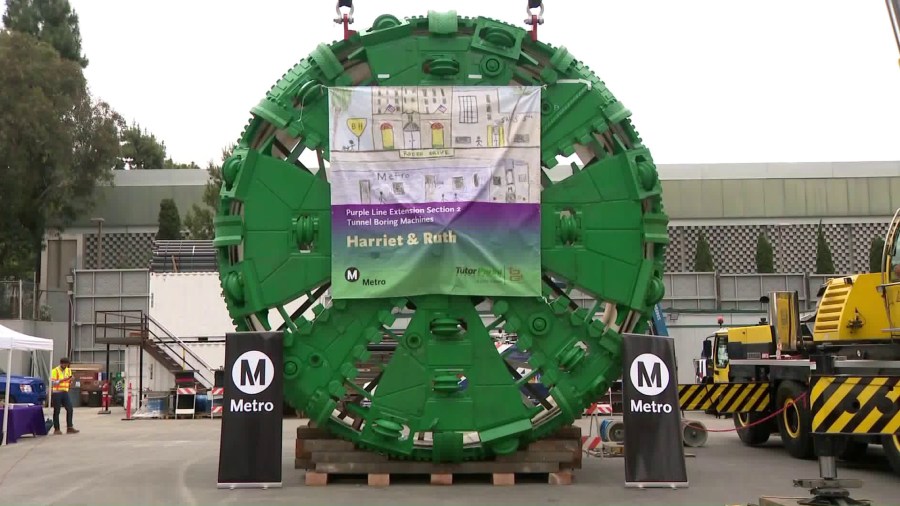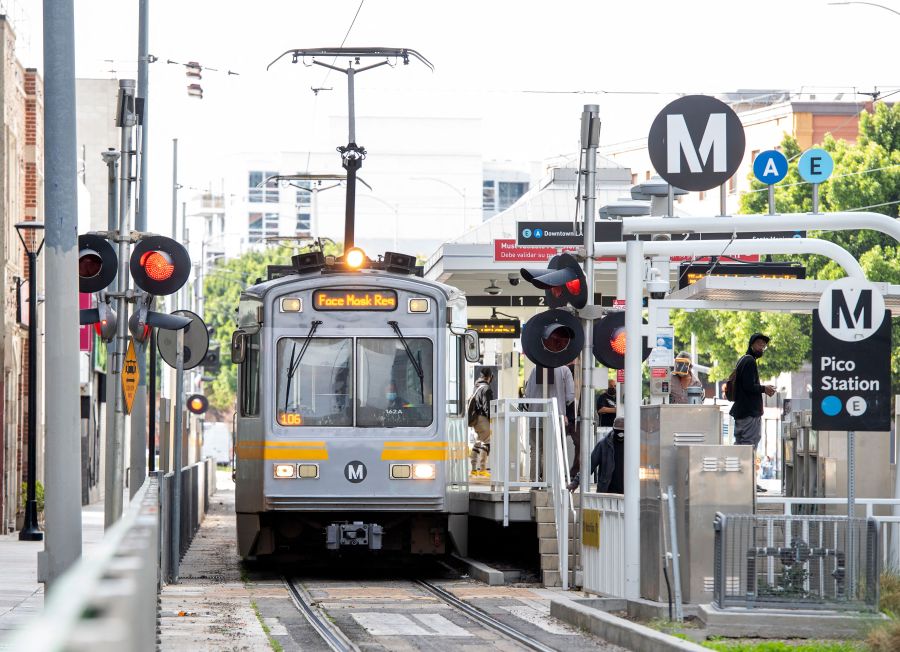The Biden Administration has awarded the Los Angeles region nearly $900 million for public transportation and infrastructure improvements ahead of the 2028 Summer Olympics.
Of that batch of federal dollars, more than $860 million is earmarked for the Los Angeles County Metropolitan Transportation Authority, aka LA Metro.
The cash infusions will help to expand the Metro rail system and “reconnect communities” ahead of the 2028 Olympic and Paralympic Games, according to Los Angeles Mayor Karen Bass.
LA Metro will receive about $710 million through the Bipartisan Infrastructure Law and the United States Department of Transportation’s 2024 budget.
The bulk of that money will be put toward two projects, including the East San Fernando Valley Light Rail Transit Project, which will add light rail train service in the San Fernando Valley between Van Nuys and Sylmar.
Tens of millions in federal grant funding will also be used in the construction of sections two and three of the D Line Subway Extension Project, which will add nine miles of underground subway and seven stations connecting downtown Los Angeles with the Westside.
Both of those projects are expected to be completed — in some form — before 2028.
Metro CEO Stephanie Wiggins says these “game-changing” improvements will be welcome news to anyone, resident or tourist, who wants to avoid the city’s infamous traffic.

In addition to that funding, the Los Angeles region has also been chosen to receive $160 million to improve street and transit infrastructure, traffic safety and connectivity between neighborhoods.
About $139 million of that additional funding will also be directed to LA Metro as it looks to “reconnect communities across highway and arterial barriers by creating multimodal investments.”
Those investments include improving the reliability and speed of buses, “first/last mile” projects and other mobility solutions. Bass says these investments will improve connectivity throughout Los Angeles County and benefit at least 1 million “disadvantaged Angelenos.”
LA Metro will also receive just shy of $10 million, which it will put toward pedestrian safety and accessibility improvements like upgraded crosswalks, ADA-compliant curbs and improved sidewalks. A pedestrian and bicycle bridge over the 710 freeway will be built alongside an existing vehicle crossing at Humphreys Avenue, providing improved connectivity to and from East Los Angeles.
But it isn’t just LA Metro that’s receiving much-needed federal support.
The Port of Los Angeles will receive $5 million to help build a pedestrian bridge over two sets of freight train tracks that will better connect Wilmington residents with the Wilmington Waterfront.
Friends of the Hollywood Central Park will receive about $3.6 million to move forward with plans to build a 44-acre park that goes over the top of the 101 Freeway.
Finally, the City of Los Angeles will receive $2 million to spend on removing vehicle traffic on a section of Wilshire Boulevard that bisects Macarthur Park in Westlake. That roadway is considered a “high-injury arterial” and is located near multiple elementary schools, the city says. In closing that section of roadway, 1.7 acres of open space will be restored in one of the most “park-poor” areas of the city.

These planned improvements are all part of LA Metro’s “Vision 2028” plan to transform the county’s mobility offerings ahead of one of the biggest events in the region’s history and, in the process, improve the lives of more than 10 million people who call the Los Angeles area home.
“I thank President Biden, Senators [Alex] Padilla and [Laphonza] Butler and all of Los Angeles’ federal representatives for their continued partnership to help us secure the funding needed to expand Metro’s transportation system, build new infrastructure at the Port of Los Angeles and increase safety, accessibility, and sustainability for all residents and visitors in the region,” Bass said.
Bass and a delegation from Los Angeles just returned from a trip to Paris, the host city of the 2024 Summer Olympics, to see how the city is preparing for the world’s biggest sporting event and see firsthand where Los Angeles will need to improve to ensure it’s ready when it steps into the spotlight.
The 2028 Olympic games will be here before you know it, and Bass says there is “no time to waste” when it comes to strengthening the local transportation system.




















